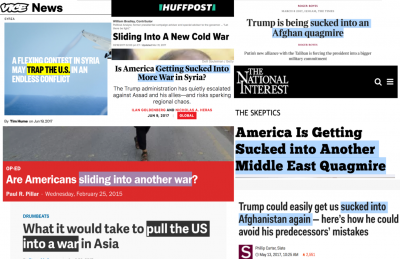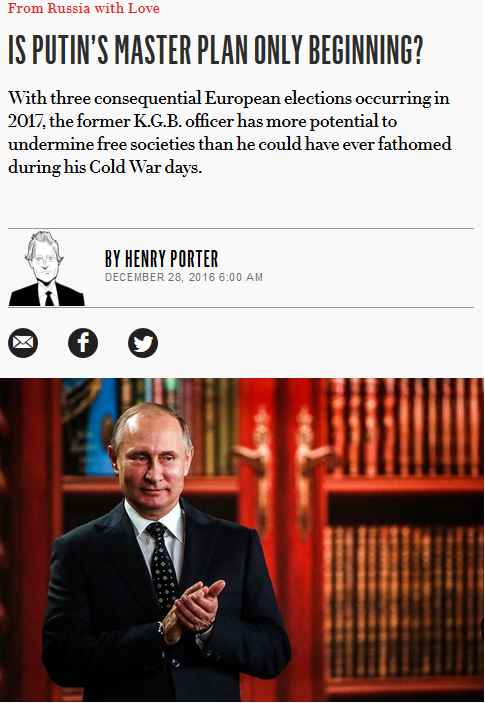Syria Media Distortions: The Latest Case of US “Stumbling” Into War

A recent headline in The Atlantic (6/9/17) earnestly pondered if the US was “Getting Sucked Into More War in Syria.” “Even as Washington potentially stumbles into war…” was how the article’s discussion began.
One of the most common tropes in US media is that the US military always goes to war reluctantly—and, if there are negative consequences, like civilian deaths, it’s simply a matter of bumbling around without much plan or purpose.
This framing serves to flatter two sensibilities: one right and one vaguely left. It satisfies the right-wing nationalist idea that America only goes to war because it’s compelled to by forces outside of its own control; the reluctant warrior, the gentle giant who will only attack when provoked to do so. But it also plays to a nominally liberal, hipster notion that the US military is actually incompetent and boobish, and is generally bad at war-making.
This is expressed most clearly in the idea that the US is “drawn into” war despite its otherwise unwarlike intentions.
“Will US Be Drawn Further Into Syrian Civil War?” asked Fox News (4/7/17).
“How America Could Stumble Into War With Iran,” disclosed The Atlantic (2/9/17),
“What It Would Take to Pull the US Into a War in Asia,” speculated Quartz (4/29/17).
“Trump could easily get us sucked into Afghanistan again,” Slate predicted (5/11/17).
The US is “stumbling into a wider war” in Syria, the New York Times editorial board (5/2/15) warned.
“A Flexing Contest in Syria May Trap the US in an Endless Conflict,” Vice News (6/19/17) added.
“Sliding,” “stumbling,” ”sucked into,” “dragged into,” ”drawn into”: The US is always reluctantly—and without a plan—falling backward into bombing and occupying. The US didn’t enter the conflict in Syria in September 2014 deliberately; it was forced into it by outside actors. The US didn’t arm and fund anti-Assad rebels for four years to the tune of $1 billion a year as part of a broader strategy for the region; it did so as a result of some unknown geopolitical dark matter.

Note that “self-defense” here means shooting down a plane flying over another country because it’s trying to bomb forces that you’re supporting to try to overthrow that country’s government. (Reuters, 6/19/17)
Syria especially evokes the media’s “reluctantly sucked into war” narrative. Four times in the past month, the Trump administration has attacked pro-regime forces in Syria, and in all four instances they’ve claimed “self-defense.” All four times, media accepted this justification without question (e.g., Reuters, 6/19/17), despite not a single instance of “self-defense” attacks occurring under two-and-a-half years of the Obama administration fighting in Syria. (The one time Obama directly attacked Syrian government forces, the US claimed it was an accident.)
Why the sudden uptick in “self-defense”? Could it be because, as with the bombing of ISIS (and nearby civilians), Trump has given a green light to his generals to adopt an itchy trigger finger? Could it be Trump and Secretary of Defense James Mattis, who has a decades-long grudge against Iran, want to blow up Iranian drones and kill Iranian troops? No such questions are entertained, much less interrogated. The US’s entirely defensive posture in Syria is presented as fact and serves as the premise for discussion.
When US empire isn’t reluctant, it’s benevolent.
“Initially motivated by humanitarian impulse,” Foreign Policy‘s Emile Simpson (6/21/17) insisted, “the United States and its Western allies achieved regime change in Libya and attempted it in Syria, by backing rebels in each case.”
“At least in recent decades, American presidents who took military action have been driven by the desire to promote freedom and democracy,” the New York Times editorial board (2/7/17) swooned.
“Every American president since at least the 1970s,” Washington Post’s Philip Rucker (5/2/17) declared, “has used his office to champion human rights and democratic values around the world.”
Interpreting US policymakers’ motives is permitted, so long as the conclusion is never critical.
Vanity Fair (12/28/16): No “stumbling” for Vladimir Putin.
In contrast, foreign policy actions by Russia are painted in diabolical and near-omnipotent terms.
“Is Putin’s Master Plan Only Beginning?” worried Vanity Fair (12/28/16).
“Putin’s Aim Is to Make This the Russian Century,” insists Time magazine (10/1/16).
Russia isn’t “drawn into” Crimea; it has a secret “Crimea takeover plot” (BBC, 3/9/15).
Putin doesn’t “stumble into” Syria; he has a “Long-Term Strategy” there (Foreign Affairs, 3/15/16).
Military adventurism by other countries is part of a well-planned agenda, while US intervention is at best reluctant, and at worst bumfuzzled—Barney Fife with 8,000 Abrams tanks and 19 aircraft carriers.
Even liberals talk about war in this agency-free manner. Jon Stewart was fond of saying, for example, that the Iraq war was a “mistake”—implying a degree of “aw shucks” mucking up, rather than a years-long plan by ideologues in the government to assert US hegemony in the Middle East.
War, of course, isn’t a “mistake.” Nor, unless your country is invaded, is it carried out against one’s will. The act of marshalling tens of thousands of troops, scores of ships, hundreds of aircraft, and coordinating the mechanisms of soft and covert power by State and CIA officials, are deliberate acts by conscious, very powerful actors.
Media shouldn’t make broad, conspiratorial assumptions as to what the bigger designs are. But neither are they under any obligation to buy into this mythology that US foreign policy is an improvised peace mission carried out by good-hearted bureaucrats, who only engage in war because they’re “sucked into” doing so.
Adam Johnson is a contributing analyst for FAIR.org.
Featured image: FAIR


